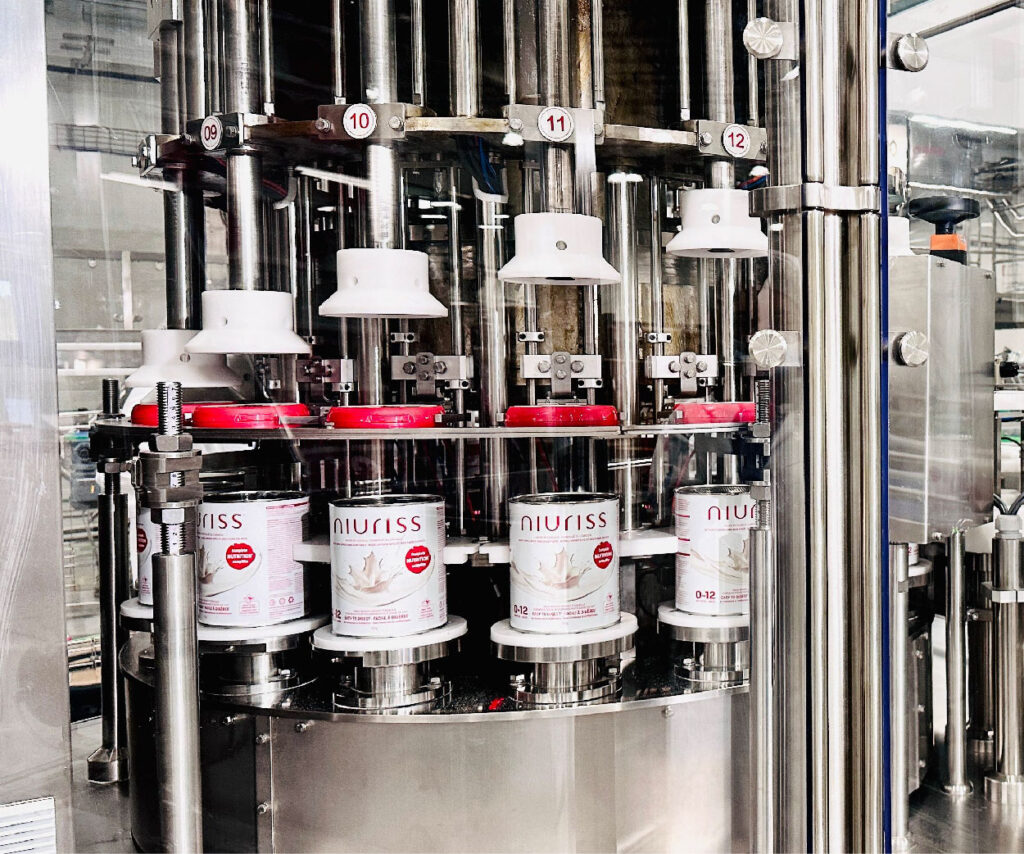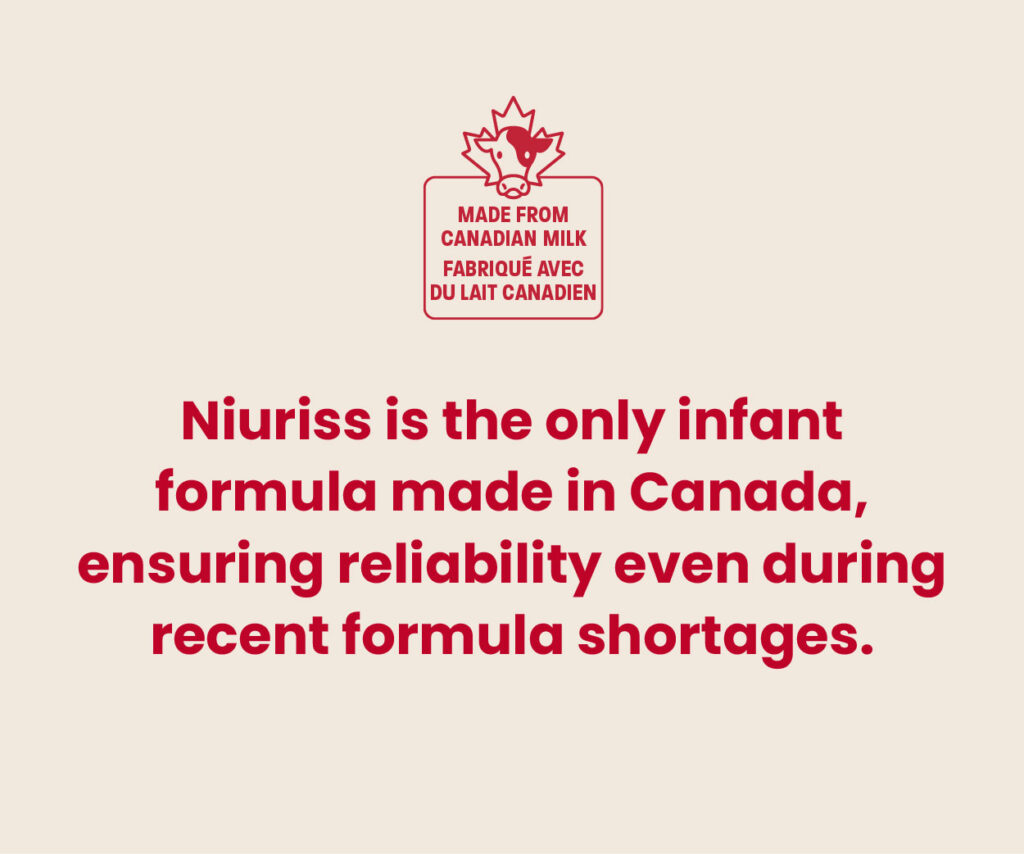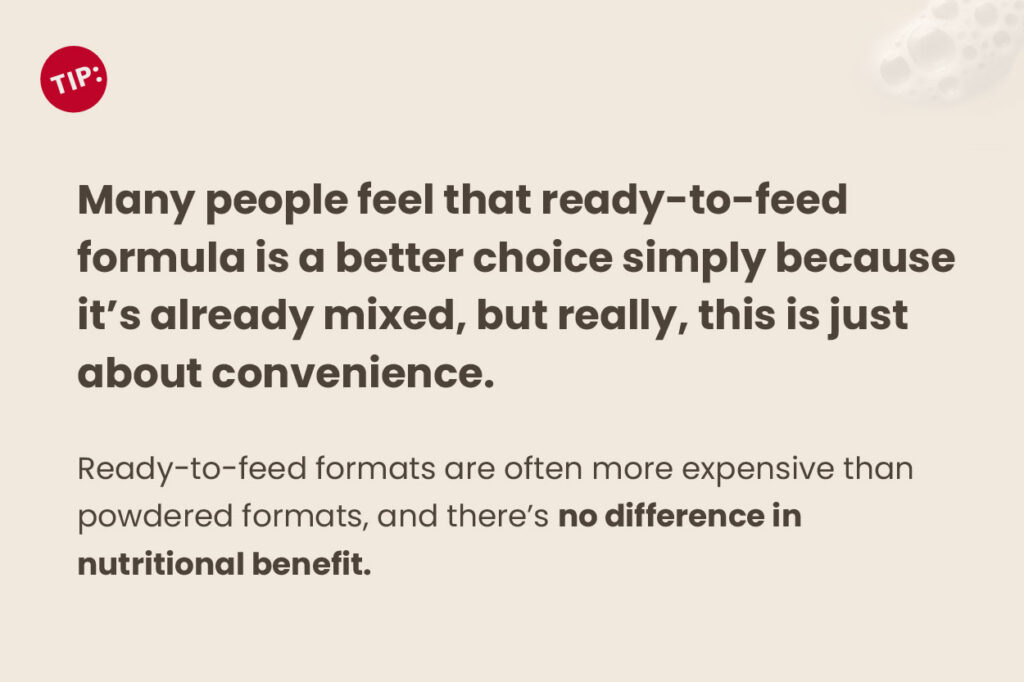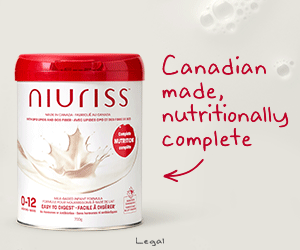Most first-time parents expect breastfeeding to come naturally, but for some families, it’s anything but. Read on to learn more about what to consider when introducing formula, including smart tips from our friends at Niuriss.
Most expectant parents in Canada plan to breastfeed their newborns. In fact, according to data released by Statistics Canada in October 2024, a whopping 91 percent of new Canadian mothers surveyed initiated breastfeeding with their newborns, and 69 percent nursed for at least six months. That stat is among the highest in the world.
This is great news, overall. Breastfeeding can provide major benefits for both mothers and babies. But things don’t always go to plan. While breastfeeding is a natural process, it can be extremely challenging for some families. Mothers can face challenges like delayed lactation after birth (particularly after a C-section), low or waning milk supply over time or breast infections, while infants may have issues like tongue ties, poor latching or the need for supplementation. It shouldn’t be emotionally trying or painful to feed your little one, so if you experience these kinds of difficulties, there’s no shame in supplementing with or switching to formula. In fact, it’s worth being prepared for this possibility before you even welcome your new addition. It can help to learn about the different types of formulas and have bottle-feeding supplies ready, just in case your feeding journey takes an unexpected turn.

Being Open-Minded About Feeding
For many people, it’s not about deciding between breastfeeding and formula feeding. Instead, it’s about being open to the idea that you may need to be flexible. Many new breastfeeding moms don’t know when they aren’t producing enough milk, for example, and they’re confused by babies who always seem to be hungry or have a hard time settling. Even moms who seek out ways to boost milk supply may struggle to make enough to keep their little ones full. Adding formula to the mix can help infants to feel satisfied, which can lead to less fussiness, improved sleep and an overall easier time for new parents. (An important note: It can take four to seven days for an infant to adapt to a change in feeding.)

The bottom line is, if something isn’t working for you or your baby, it’s worth considering a change. Ask your primary care team for guidance on formula; your doctor, your child’s doctor or a public health nurse will all have insights on how to improve the feeding experience for everyone.
Making the Decision to Try Formula
You’ll start with choosing a type of bottle and nipple for your baby—this can take a little trial and error—as well as a type of formula. (It’s essential to note that all formulas available in Canada meet the nutritional requirements set by Health Canada, so you really can’t go wrong nutritionally. It’s just about what works best for your child.) If you’re looking for a local option, Niuriss is made with Canadian milk in a state-of-the-art facility in Kingston, Ontario, giving parents a safe, domestic option they can feel confident about. It also recently earned ParentsCanada’s Tried & Trusted seal, underscoring its exceptional quality and reliability.


“We’ve loved our experience with Niuriss! We used to use a different brand of formula but it was constantly having shortages and was hard to find. We tried Niuriss and my baby hasn’t had a diaper blowout since the switch! She enjoys the taste of Niuriss, it mixes very well and I love the way the package is thoughtfully designed (not losing the scoop in the powder because of the wider lip on the can).” — Gillian G.
Niuriss also provides top-quality infant nutrition that adheres to the highest global standards of quality and safety. It’s formulated using premium ingredients and locally sourced Canadian milk free from artificial growth hormones and antibiotics. Niuriss products are also first-to-market nationally to include OPO lipids, which are designed to closely resemble the fat structure of breast milk. The benefits of OPO lipids, which support the overall well-being of babies supplemented with or exclusively fed formula, have been clinically tested since 1995. Niuriss is both Kosher- and Halal-certified.
Other benefits of Niuriss include the following:
- GOS fiber and OPO Lipids work together to ease digestion and promote a healthy gut microbiome
- Reduction in constipation, which results in less crying and better sleep
- Enhancement of fatty acid absorption for better energy intake
- Support calcium absorption for better bone density

Choosing a Formula Format
Once you’ve landed on a formula brand, next you’ll choose the format that works best for your family. The main formats available include powdered, liquid concentrate and ready-to-use. They all have their pros and cons, but if you choose powder, just be sure to select one, like Niuriss, that has excellent consumer feedback on solubility. Easy mixing is key in the middle of the night!
Just like the formula itself, each format has to be approved by Health Canada, so again, whatever choice you make is safe for your baby. Just remember to properly sterilize all feeding equipment (bottles, nipples, etc.) before each use.
“I really like how easy it was to prepare. My baby really enjoyed it and didn’t have any digestive issues. I love that it’s made in Canada.” — Rosanna C.
Admittedly, formula can put a significant dent in your weekly grocery budget, and while it can be tempting to go with whatever is on sale each week, consistency is better for your little one. Choose something at a price point that is comfortable for you no matter the price fluctuation.
Niuriss knows the monetary challenge formula presents and is committed to helping new parents to manage their formula budget for the first year. That’s why they’ve created their Nest program, which offers price protections against cost increases. There are other Niuriss Nest member-exclusive perks, including deals for formula, shipping price breaks and more.

Knowing Your Baby Is Happy and Healthy
The first year after you welcome a new baby, whether this is your first or fifth, can be an exhausting, worrisome time. But take feeding out of the equation. If you’re making educated decisions based on your child’s needs, you’re doing a great job. There’s no right way or wrong way to feed your baby, so cut yourself some slack and place your worries somewhere else. And remember, ParentsCanada and Niuriss are here for you, every step of the way.

Niuriss Infant Formula has earned the ParentsCanada Tried & Trusted Seal of Approval!
We invited 20 parents to try Niuriss Infant Formula with their babies and share their honest feedback in a follow-up survey. The results spoke for themselves. Niuriss impressed our parent testers and met the high standards required to achieve our seal. Read on HERE to find out what some of these parents had to say!









